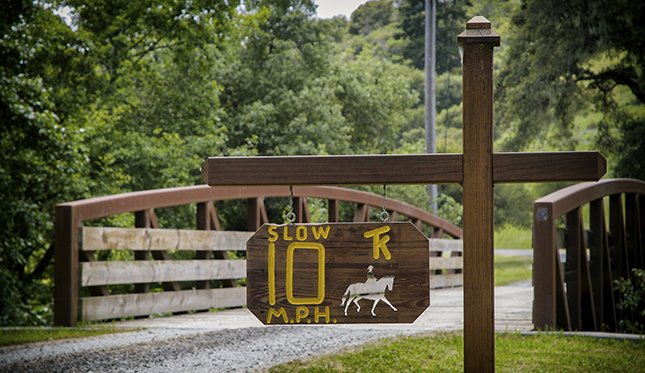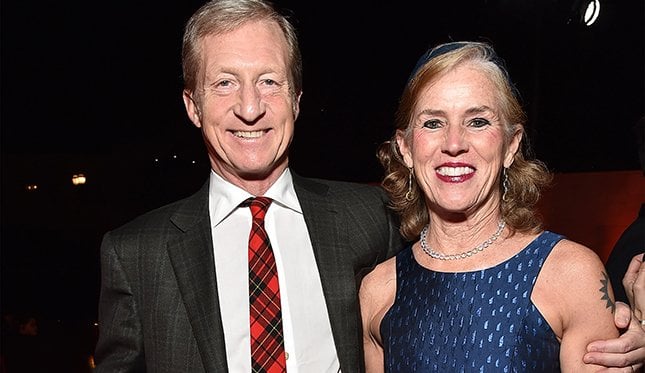Kat Taylor, the CEO of Oakland-based Beneficial State Bank, co-owner of the 1,800-acre TomKat Ranch, and wife of billionaire investor and anti-Trump activist Tom Steyer, has built a career around putting business and finance to work for the common good. On a rainy Friday afternoon, Taylor spoke with Worth from her San Francisco home about the changing face of philanthropy in the Bay Area.
For Taylor and Steyer, finance and politics are intertwined. Steyer is donating millions of dollars to Democratic political causes and pushing for the impeachment of Donald Trump through a series of provocative television ads.
Taylor, though less explicitly involved in politics, runs her bank, the ranch and her nonprofits in line with her political ideals. While both Taylor and Steyer are unabashed capitalists, there’s a political argument in the ways they run their businesses and nonprofits: Capitalism is broken, and has to change.

Q: How have you connected your values to the way you do business and operate your philanthropies?
A: We’ve had a lot of advantage in our lives, my husband Tom Steyer and myself. With this kind of privilege comes huge responsibility to be part of making this world the best place to live and work for all, and it’s not, right now, at all. We have the worst income and wealth disparity imaginable. There’s social and political chaos and climate disaster breathing down our backs.
How do you respond to those trends?
Put more different and younger people in charge. We’re trying to use our position to give voice to those alternative approaches, because the economy’s not working on any basis right now.
When did you really begin to put your concerns into action?
Around 2004 when John Kerry was not elected president, Tom and I just got this sense of dire need, like— we’ve got to drop everything and work on this full time. We ended up making significant investments in research stations, the ranch and the bank where we could take a systems approach to food and finance and try to get insights into what was wrong in those industries. We’ve also realized that we cannot remain conventionally invested. Nobody in society should be conventionally invested. We can’t give that prerogative to fossil fuels and private prisons and payday lending. Our first principle is do no harm and then do some good.
Given that you and your husband are both very wealthy and that he in particular is high-profile, your activism must rub some entrenched interests the wrong way.
We’re likely going to make some enemies. Because the people who have the power to change the status quo rarely do, because it’s from whence their power comes. We have to be willing to cede power in order to change the status quo.


With the ranch, you preserve a large amount of land in the San Francisco Bay area and work on improving soil science and environmental impact of ranching. For some people, the idea that cattle can be ranched sustainably and may actually be beneficial to the environment is a radical notion.
We’re trying to make a case that there is a responsible way to raise beef that generates benefits that society needs. If we never ate another steak, we’d still need the ungulates there. I actually engage in pretty crazy ideas.
Such as?
I’m not sure we should have private property rights over land. It’s our commons. I think we should have the right to occupy land based on our stewardship. So we may go to a model like that one day. Right now Tom and I own TomKat Ranch, and the TomKat Ranch Educational Foundation is a 501(c)3 non-profit that does all of the science, convening and learning lab. But we might go towards a model where people have a right to work the land and get a share of wealth from it because of the practices that they pursue.
You’ve described Beneficial State Bank as a research project. Why do you say that?
We embrace regulation. Because in the regulation of banks, there is a clue of what banks are—quasi-public institutions. They should not be considered purely private corporations that have only a duty to the economic shareholder. They actually have a duty to the public interest. The only reason we establish a banking system is to finance the future in which we all wish to live and work.
So we started a bank with the hunch that there’s something terribly wrong in the banking system, and there is, and the public is aware of it. But it’s worse than they know. With the prerogative of FDIC insurance, banks are able to collect deposits from all of us, our idle cash, and they get to collect it very cheaply. It’s probably the second lowest cost of capital in the American economy after securitization.
Yet it comes with responsibilities not just to operate a bank safely and soundly, so we don’t lose the deposits which are entrusted to us and insured up to $250,000, but all sorts of other things, like not to discriminate in our lending practice, not to redline, not to launder money, not to disclose private consumer information, not to allow cyber security breaches….
How did the banking system get to this point?
The banks have been allowed to become less and less accountable to the public, the communities in which they work, the customers that they serve, the colleagues that they hire, and the planet on which we all depend. They’re pretty much trashing every one of those constituencies other than the economic shareholder. And they can get away with that because they know they’re too big to fail and in fact, we keep going in and out of recessions because of institutions that present a systemic risk.
In terms of another radical idea: The biggest money center banks don’t actually lend much of anything into the main economy. They’re huge hedge funds and private equity firms, and they take a lot of speculative risk. They have very high returns. They are acting in a way that is absolutely [counter] to the risk profile of their biggest creditor, which is the depositors. And it’s shocking that they don’t lend to Main Street. They’re really not performing the banking function at all, and they’re doing all this other harm. I think JP Morgan Chase has $950 billion in lending to fossil fuel companies.
BlackRock CEO Larry Fink wrote in his 2018 letter to investors about the danger of climate change, but most of BlackRock’s assets are in ETFs, which structurally support the carbon-based economy.
Yes. Once again here, the first thing the banks have to stop doing is producing harm. They just have to stop. Larry Fink said all their portfolio companies would be required to do one good thing. [Fink’s letter called on companies to show how they “make a positive contribution to society”] We wrote an op-ed back and said keep your stinking one good thing. Tell companies to stop all the harm, because that’s what fossil fuels and private prisons and payday lending and fracking are doing to us.
So a good radical idea that I have is that, because we haven’t been able to regulate these monstrously maverick organizations called money center banks, is that the rest of us in the FDIC insurance program should revoke their ability to get FDIC insurance. They’re not acting in a way that deserves it. They’re breaking every implicit covenant of self-insurance. They should be out of there and that would return $13 trillion of deposits, which is what is in the American economy, to the real economy, to the real banks that lend to Main Street.







